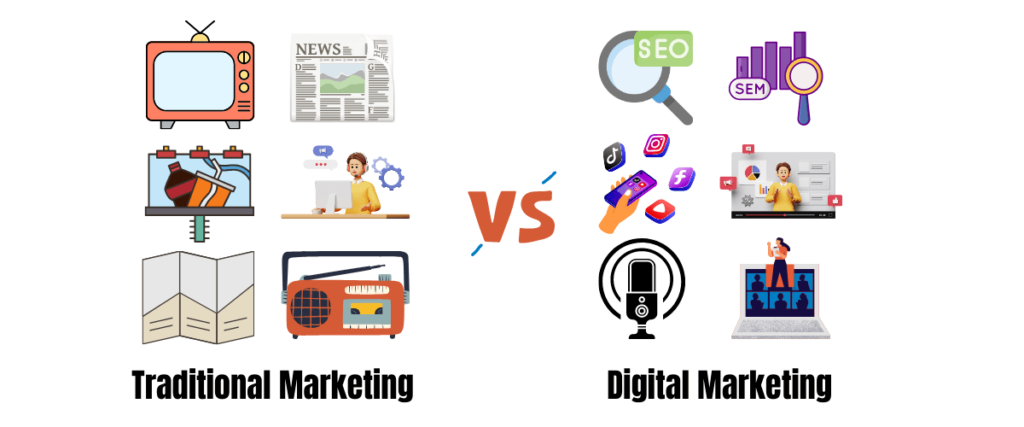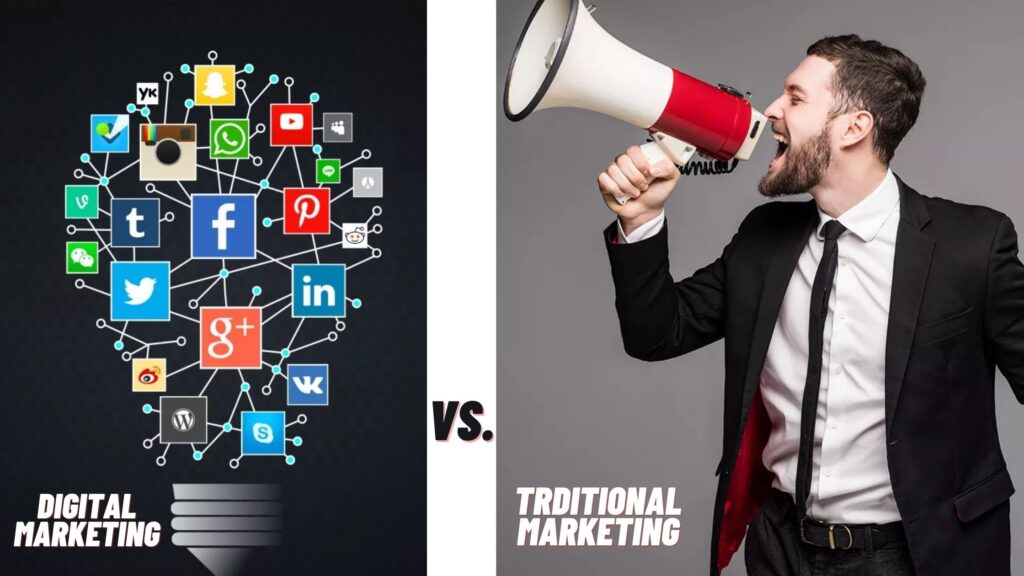Do you know , We can make 10 lac Rs profit a month by learning and using Digital Marketing in any business. In today’s date it is very crucial and important to know about the digital world around, and if you are into any small or large scale business , then it must be mandatory to be updated on what is going on in the digital and traditional markets . This blog can help you understand in what way you can promote your business online or offline based on the nature of business and do marketing accordingly. In order to understand this firstly we need to understand the difference between Digital marketing and Traditional marketing.
Digital marketing and traditional marketing are two distinct approaches to promoting products or services, each with its own set of advantages and limitations. Let’s explore the key differences between the two:
- Reach and Targeting:
- Reach and Targeting:
-
-
- Traditional Marketing: Traditional marketing methods, such as print ads, TV commercials, and billboards, typically have a broad reach but limited targeting capabilities. These methods reach a wide audience but may not effectively reach specific demographics or segments.
- Digital Marketing: Digital marketing allows for precise targeting based on factors like demographics, interests, behavior, and location. Through tools like social media advertising, search engine marketing, and email marketing, digital marketers can reach highly specific audiences.
-
- Cost Effectiveness:
-
-
- Traditional Marketing: Traditional marketing campaigns often require significant financial investment. Costs can include production, distribution, and placement of advertisements, which can be expensive, especially for mediums like TV or print or large bill broads.
- Digital Marketing: Digital marketing campaigns can be more cost-effective, particularly for small businesses or startups with limited budgets. With digital channels, marketers can set specific budgets and track ROI more effectively, adjusting campaigns as needed to optimize performance.
-
- Measurability and Analytics:
-
-
- Traditional Marketing: Measuring the effectiveness of traditional marketing efforts can be challenging. While methods like coupon codes or unique phone numbers can track responses to specific campaigns, overall metrics are often harder to quantify.
- Digital Marketing: One of the key advantages of digital marketing is the ability to track and analyze campaign performance in real-time. Marketers can monitor metrics such as website traffic, conversion rates, email open rates, and engagement levels, allowing for data-driven decision-making and continuous optimization.
-
- Interactivity and Engagement:
-
-
- Traditional Marketing: Traditional marketing channels are generally one-way communication mediums, where the audience passively receives the message. Engagement levels can be lower compared to digital channels.
- Digital Marketing: Digital marketing offers opportunities for interactive and engaging experiences. Social media platforms, for example, enable two-way communication between brands and consumers, fostering engagement, feedback, and community building.
-
- Flexibility and Adaptability:
-
- Traditional Marketing: Traditional marketing campaigns often require significant lead time for planning, production, and distribution. Changes or updates to campaigns can be cumbersome and costly.
- Digital Marketing: Digital marketing campaigns are more flexible and adaptable. Marketers can make real-time adjustments to campaigns based on performance data, modify targeting parameters, or experiment with different creative elements quickly and cost-effectively.

In conclusion, while traditional marketing still has its place and can be effective for certain objectives, digital marketing offers unparalleled targeting capabilities, cost-effectiveness, measurability, and flexibility, making it a preferred choice for many businesses in today’s digital age. However, the most effective marketing strategies often integrate elements of both traditional and digital approaches to reach a diverse audience across multiple channels. Fore more such informative blogs please visit our website www.kaizengroupofmanagement.com

